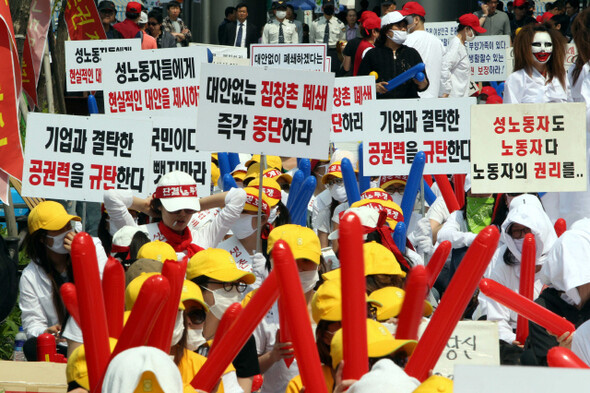hankyoreh
Links to other country sites 다른 나라 사이트 링크
Before ruling on prostitution, masked sex workers to rally in Seoul

Before the Constitutional Court rules on the constitutionality of the Special Law on Prostitution, several thousand female sex workers will join a large masked demonstration in downtown Seoul, the first such demonstration in four years. After the court struck down a law against adultery, female sex workers and related businesses have their hopes up, but feminist organizations argue that a hasty attempt to argue for the law’s unconstitutionality will not help the cause of women‘s rights.
Female sex workers will hold a demonstration in front of the Constitutional Court in Seoul on Apr. 9, before the Constitutional Court holds its first public hearing.
“On the first day of the public hearing, about ten female sex workers will stand in front of the Constitutional Court to read aloud a petition to abolish the Special Law on Prostitution, signed by 882 female sex workers around the country, and then submit the petition to the court,” said Kang Hyeon-jun, 61, president of Hanteo National Union, an organization for female sex workers and brothel owners.
The group is planning a large demonstration of around 4,000 women that will be held in downtown Seoul at the end of the month.
Four years have passed since the previous demonstration in Sep. 2011, when about 1,000 female sex workers whose faces were covered with masks joined a demonstration in front of the Bosingak Belfry in Jongno, Seoul. The women called for the abolition of the Special Law on Prostitution, which they said was threatening their livelihoods and infringing on their rights.
The Special Law on Prostitution includes the Act On the Punishment Of Acts Of Arranging Sexual Traffic and the Act On the Prevention Of Sexual Traffic And Protection, Etc. of Victims, both legislated in 2011.
The Hanteo National Union is also planning to submit examples of human rights violations caused by the law to the United Nations Human Rights Council.
“The police take photos of the naked bodies of female sex workers during a crackdown. Since condoms are used as a major source of evidence, women who are being apprehended sometimes swallow them,” Kang said.
“The court’s decision that the adultery law was unconstitutional is likely to work in favor of sex workers. Since the decision, I keep seeing media reports suggesting that the Special Law on Prostitution should be abolished,” said Shim Seon-jin, director of Sonya’s House, which provides counseling to female sex workers.
“Some are advocating that women have the right to decide their own sexuality, but that would mean that prostitution would become another job. What kind of father would want his daughter to do that kind of work?” said Oh Gyeong-shik, a law professor at Gangneung-Wonju National University. Oh is an expert witness arguing for the constitutionality of the law in the public hearing.
“Even if the women are participating in sexual work of their own free will, the government has to use its power of prosecution for the social good of maintaining order in society through establishing healthy sexual customs,” Oh.
“Rather than the Constitutional Court deciding whether the law is constitutional, the legislature ought to be revising and augmenting the laws to make it possible to make a living without engaging in prostitution,” Oh said.
At the end of last month, National Solidarity for Resolving the Problem of Prostitution, which provides counseling and support to female sex workers in 13 areas in South Korea submitted an amicus brief to the court arguing that not prosecuting female sex workers, who are vulnerable members of society, is a condition for protecting the rights of women and for breaking up the oppressive structure of the sex industry.
“What we need to be doing is to push the National Assembly to pass laws to prosecute the brokers and the customers,” said Chung Mi-rye, co-president of the group.
By Kim Kyu-nam, staff reporter
Please direct questions or comments to [english@hani.co.kr]

Editorial・opinion
![[Editorial] Does Yoon think the Korean public is wrong? [Editorial] Does Yoon think the Korean public is wrong?](https://flexible.img.hani.co.kr/flexible/normal/500/300/imgdb/original/2024/0417/8517133419684774.jpg) [Editorial] Does Yoon think the Korean public is wrong?
[Editorial] Does Yoon think the Korean public is wrong?![[Editorial] As it bolsters its alliance with US, Japan must be accountable for past [Editorial] As it bolsters its alliance with US, Japan must be accountable for past](https://flexible.img.hani.co.kr/flexible/normal/500/300/imgdb/original/2024/0417/6817133413968321.jpg) [Editorial] As it bolsters its alliance with US, Japan must be accountable for past
[Editorial] As it bolsters its alliance with US, Japan must be accountable for past- [Guest essay] Amending the Constitution is Yoon’s key to leaving office in public’s good graces
- [Editorial] 10 years on, lessons of Sewol tragedy must never be forgotten
- [Column] A death blow to Korea’s prosecutor politics
- [Correspondent’s column] The US and the end of Japanese pacifism
- [Guest essay] How Korea turned its trainee doctors into monsters
- [Guest essay] As someone who helped forge Seoul-Moscow ties, their status today troubles me
- [Editorial] Koreans sent a loud and clear message to Yoon
- [Column] In Korea’s midterm elections, it’s time for accountability
Most viewed articles
- 1[Column] The clock is ticking for Korea’s first lady
- 2Samsung barricades office as unionized workers strike for better conditions
- 3[Editorial] When the choice is kids or career, Korea will never overcome birth rate woes
- 4[News analysis] After elections, prosecutorial reform will likely make legislative agenda
- 5Why Israel isn’t hitting Iran with immediate retaliation
- 6S. Korea, Japan reaffirm commitment to strengthening trilateral ties with US
- 7[Editorial] Does Yoon think the Korean public is wrong?
- 8[Guest essay] How Korea turned its trainee doctors into monsters
- 9[Editorial] 10 years on, lessons of Sewol tragedy must never be forgotten
- 10Strong dollar isn’t all that’s pushing won exchange rate into to 1,400 range